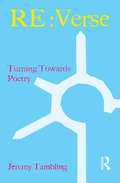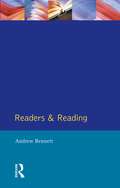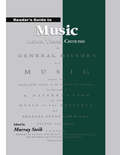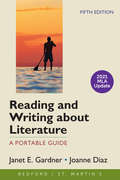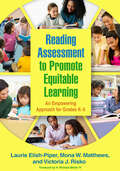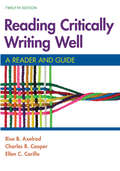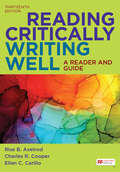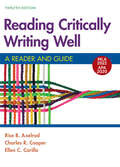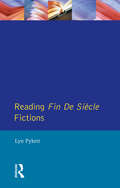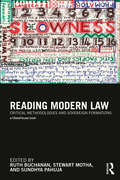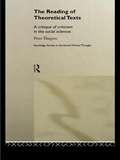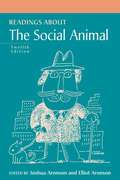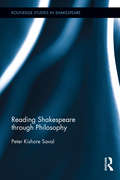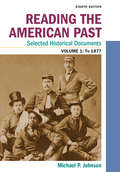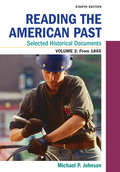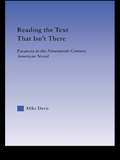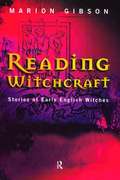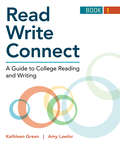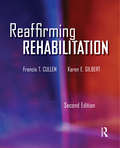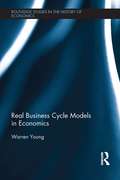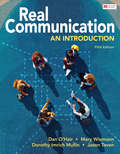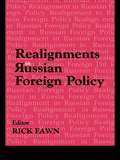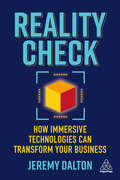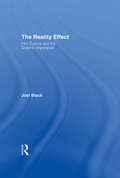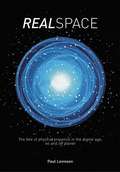Special Collections
Benetech’s Global Certified Accessible Titles
Description: Benetech’s GCA program is the first independent third-party EPUB certification to verify ebook accessibility. By creating content that is born accessible, publishers can meet the needs of all readers. Learn more: https://bornaccessible.benetech.org/
- Table View
- List View
RE
by Jeremy TamblingMany people are intimidated by poetry, thinking it difficult and high-brow and not for them. But it is still considered an essential part of art and literature. RE:Verse asks; Why and How should we read poetry? This book, aimed at people just starting with literature, takes nothing for granted but opens poetry up to all in a way that makes it both exciting and fresh. Examples are taken from a balanced combination of traditional writers such as Keats, Wordsworth, Blake and Shakespeare, and modern poets such as Seamus Heaney, Jackie Kay and Benjamin Zephaniah. RE:Verse ranges over all periods of literature, and over the many critical theories that attempt to show why poetry matters. It places poems into their historical context, looks at poetry in translation, and discusses why much poetry is so difficult as to seem almost unreadable. It sets the standard for talking about how to read poetry, and what to do when this seems to be impossibly difficult. Ultimately, it is the essential, easy-to-read guide to the subject.
Readers and Reading
by Andrew BennettMuch literary criticism focuses on literary producers and their products, but an important part of such work considers the end-user, the reader. It asks such questions as: how far can the author condition the response of the reader, and how much does the reader create the meaning of a text? Dr Bennett's collection includes important essays from such writers and critics as Wolfgang Iser, Mary Jacobus, Roger Chartier, Michel de Certeau, Shoshana Felman, Maurice Blanchot, Paul de Man and Yves Bonnefoy. It looks in turn at deconstructionist, feminist, new historicist and psychoanalytical response to the school. The book then considers the act of reading itself, discussing such issues as the uniqueness of any reading and the difficulties involved in its analysis.
Reader's Guide to Music
by Murray SteibThe Reader's Guide to Music is designed to provide a useful single-volume guide to the ever-increasing number of English language book-length studies in music. Each entry consists of a bibliography of some 3-20 titles and an essay in which these titles are evaluated, by an expert in the field, in light of the history of writing and scholarship on the given topic. The more than 500 entries include not just writings on major composers in music history but also the genres in which they worked (from early chant to rock and roll) and topics important to the various disciplines of music scholarship (from aesthetics to gay/lesbian musicology).
Reading and Writing about Literature with 2021 MLA Update
by Janet E. Gardner and Joanne DiazThis ebook has been updated to provide you with the latest guidance on documenting sources in MLA style and follows the guidelines set forth in the MLA Handbook, 9th edition (April 2021).Reading and Writing about Literature provides the essentials of reading and writing about literature in a brief and very affordable package.
Reading Assessment to Promote Equitable Learning
by Victoria J. Risko and Laurie Elish-Piper and Mona W. MatthewsMany standard reading assessment approaches fail to capture the strengths and needs of students from diverse sociocultural, linguistic, and academic backgrounds. From expert authors, this book guides educators in planning and conducting meaningful, equitable assessments that empower K–5 teachers and students, inform responsive instruction, and help to guard against bias. The book's holistic view of reading encompasses areas from text comprehension and constrained skills to building trusting relationships and promoting students&’ agency. Twenty-eight assessment strategies are explained in step-by-step detail, including helpful implementation examples and 32 reproducible forms that teachers can download and print in a convenient 8 1/2" x 11" size.
Reading Critically, Writing Well
by Rise Axelrod and Charles Cooper and Ellen CarilloWith more critical reading coverage than any other composition text, Reading Critically, Writing Well helps students read for meaning and read like a writer. A robust catalog of reading strategies complement assignment chapters that cover four expository genres, including autobiography/literacy narratives and reflection, and four argumentative genres, including evaluation and proposal. Each chapter starts with a guide to reading that challenges students to analyze the authors' techniques, and concludes with a step-by-step guide to writing and revising that helps them apply these techniques to their own essays. The provocative readings throughout represent an array of topics and disciplines. This new edition brings on noted reading scholar Ellen Carillo (University of Connecticut), and provides more opportunities for students to learn and practice complex reading and writing strategies, with a new emphasis on inquiry, curiosity, and habits of mind. Accessible instruction, engaging readings, and effective writing assignments make Reading Critically, Writing Well ideal for instructors who want to demonstrate critical analysis and the effective rhetorical choices that students can make in their own writing.
Reading Critically, Writing Well
by Rise B. Axelrod and Charles R. Cooper and Ellen CarilloReading Critically, Writing Well, provides the support you need for read-writing connections to succeed in college and beyond.
Reading Critically, Writing Well with 2020 APA and 2021 MLA Updates
by Rise B. Axelrod and Charles R. Cooper and Ellen CarilloThis ebook has been updated to provide you with the latest guidance on documenting sources in MLA style and follows the guidelines set forth in the MLA Handbook, 9th edition (April 2021).Reading Critically, Writing Well is a diverse collection of readings from established, emerging, and student writers, combined with expert support for writing across genres. The readings aim to inspire engaged reading, spark curious conversations, and provoke thoughtful writing. Reading Critically, Writing Well provides both the readings and the support you need to make effective rhetorical choices in your own writing.
Reading Fin de Siècle Fictions
by Lyn PykettThe fin de siècle, the period 1880-1914, long associated with decadence and with the literary movements of aestheticism and symbolism, has received renewed critical interest recently. The essays in this volume form a valuable introduction to fin de siècle cultural studies and provide a commentary on important aspects of current critical debate and the place of culture in society.
Reading Modern Law
by Stewart Motha and Ruth Buchanan and Sundhya PahujaReading Modern Law identifies and elaborates upon key critical methodologies for reading and writing about law in modernity. The force of law rests on determinate and localizable authorizations, as well as an expansive capacity to encompass what has not been pre-figured by an order of rules. The key question this dynamic of law raises is how legal forms might be deployed to confront and disrupt injustice. The urgency of this question must not eclipse the care its complexity demands. This book offers a critical methodology for addressing the many challenges thrown up by that question, whilst testifying to its complexity. The essays in this volume - engagements direct or oblique, with the work of Peter Fitzpatrick - chart a mode of resisting the proliferation of social scientific methods, as much as geo-political empire. The authors elaborate a critical and interdisciplinary treatment of law and modernity, and outline the pivotal role of sovereignty in contemporary formations of power, both national and international. From various overlapping vantage points, therefore, Reading Modern Law interrogates law's relationship to power, as well as its relationship to the critical work of reading and writing about law in modernity.
The Reading of Theoretical Texts
by Peter EkegrenSince the structuralist debates of the 1970s the field of textual analysis has largely remained the preserve of literary theorists. Social scientists, while accepting that observation is theory laden have tended to take the meaning of texts as given and to explain differences of interpretation either in terms of ignorance or bias. In this important contribution to methodological debate, Peter Ekegren uses developments within literary criticism, philosophy and critical theory to reclaim this study for the social sciences and to illuminate the ways in which different readings of a single text are created and defended.
Readings About the Social Animal
by Elliot Aronson and Joshua AronsonExploring the key ideas in social psychology, this collection of classic and contemporary readings includes accounts of specific experimental findings as well as more general articles summarizing studies on such topics as attraction, prejudice, and aggression. The new edition adds 15 new readings while retaining a number of classics by leading psychological thinkers such as Stanley Milgram on obedience and Solomon Asch on conformity. Readings makes the perfect companion for the Aronson's highly praised book, The Social Animal as it follows the same major themes. The Reader can also be used with any introductory social psychology text or even in lieu of a text. Using both The Social Animal textbook and the reader is a unique and engaging combination for understanding social psychology and its research.
Reading Shakespeare through Philosophy
by Peter Kishore SavalReading Shakespeare through Philosophy advocates that the beauty of Shakespearean drama is inseparable from its philosophical power. Shakespeare’s plays make demands on us even beyond our linguistic attention and historical empathy: they require thinking, and the concepts of philosophy can provide us with tools to aid us in that thinking. This volume examines how philosophy can help us to re-imagine Shakespeare’s treatment of individuality, character, and destiny, particularly at certain moments in a play when a character’s relationship to space or time becomes an enigma to us. The author focuses on the dramatization of seemingly magical relationships between the individual and the cosmos, exploring and rethinking the meanings of 'individual', 'cosmos' and 'magic' through a conceptually acute reading of Shakespeare's plays. This book draws upon a variety of thinkers including Plato, Aristotle, Leibniz and Kant, in search of a revitalized philosophical criticism of Julius Caesar, Love’s Labor’s Lost, The Merchant of Venice, Timon of Athens, and Twelfth Night.
Reading the American Past, Volume 1: To 1877
by Michael JohnsonWith five carefully selected documents per chapter, this popular two-volume primary source reader presents a wide range of documents representing political, social, and cultural history in an accessible way. Expertly edited by Michael Johnson, co-author of The American Promise, the readings can be used to spark discussion in any classroom and will fit into any syllabus.
Reading the American Past, Volume 2: From 1865
by Michael JohnsonWith five carefully selected documents per chapter, this popular two-volume primary source reader presents a wide range of documents representing political, social, and cultural history in an accessible way. Expertly edited by Michael Johnson, co-author of The American Promise, the readings can be used to spark discussion in any classroom and will fit into any syllabus.
Reading the Text That Isn't There
by Mike DavisThrough a careful examination of the work of the canonical nineteenth-century novelists, Mike Davis traces conspiracies and conspiratorial fantasy from one narrative site to another.
Reading Witchcraft
by Marion GibsonIn this original study of witchcraft, Gibson explores the stories told by and about witches and their 'victims' through trial records, early news books, pamphlets and fascinating personal accounts. The author discusses the issues surrounding the interpretation of original historical sources and demonstrates that their representations of witchcraft are far from straight forward or reliable. Innovative and thought-provoking, this book sheds new light on early modern people's responses to witches and on the sometimes bizarre flexibility of the human imagination.
Read, Write, Connect
by Kathleen Green and Amy LawlorThe first text in a two-part series for the integrated reading and writing course, Read, Write, Connect, Book 1, offers carefully and thoroughly integrated instruction for reading and writing at the paragraph-to-essay level. With scaffolded pedagogy and a flexible structure that reflects the recursive nature of reading and writing processes, the text allows instructors to easily differentiate instruction to meet the needs of all students. It offers intensive practice in the basic skills of reading comprehension and summary writing, and then helps students build on those skills to respond to texts critically and analytically in their own college-level paragraphs and short essays.
LaunchPad Solo for Readers and Writers can be packaged with Read, Write, Connect, Book 1 at no additional cost,, allowing you to more efficiently track students’ progress with reading, writing, and grammar skills in an active learning arc that complements the book.
Reaffirming Rehabilitation
by Francis T. Cullen and Karen E. GilbertReaffirming Rehabilitation , 2nd Edition, brings fresh insights to one of the core works of criminal justice literature. This groundbreaking work analyzes the rehabilitative ideal within the American correctional system and discusses its relationship to and conflict with political ideologies. Many researchers and policymakers rejected the value of rehabilitation after Robert Martinson's proclamation that "nothing works." Cullen and Gilbert's book helped stem the tide of negativism that engulfed the U.S. correctional system in the years that followed the popularization of the "nothing works" doctrine. Now Cullen traces the social impact on U.S. corrections policy. This new edition is appropriate as a textbook in corrections courses and as recommended reading in related courses. It also serves as a resource for researchers and policymakers working in the field of corrections.
Real Business Cycle Models in Economics
by Warren YoungThe purpose of this book is to describe the intellectual process by which Real Business Cycle models were developed. The approach taken focuses on the core elements in the development of RBC models: (i) building blocks, (ii) catalysts, and (iii) meta-syntheses. This is done by detailed examination of all available unpublished variorum drafts of the key papers in the RBC story, so as to determine the origins of the ideas. The analysis of the process their discovery is then set out followed by explanations of the evolution and dissemination of the models, from first generation papers through full blown research programs. This is supplemented by interviews and correspondence with the individuals who were at the center of the development of RBC models, such as Kydland, Prescott, Long, Plosser, King, Lucas and Barro, among others. This book gets stright to the heart of the debates surrounding RBC models and as such contributes to a real assessment of their impact on modern macroeconomics. The volume, therefore, will interest all scholars looking at macroeconomics as well as historians of economic thought more generally.
Real Communication
by Dan O'Hair and Mary Wiemann and Dorothy Imrich Mullin and Jason TevenReal Communication continues to prove its reputation as the most current human communication text available. This new edition provides today�s students with the critical skills they now need most: to be able to objectively encounter increasingly digital communication contexts, examine the theory and concepts underpinning them, and competently respond in a professional, healthy, and intentional way. Utilizing a social-scientific approach to communication, the text uses engaging stories which work as small case studies that students learn to see and analyze as communication situations, discovering theory played out in practice. Authored by a leading team of communication scholars and instructors, this authoritative text helps students become social scientists in communication to confront and adapt to the challenges of today�s digital age.
Realignments in Russian Foreign Policy
by Rick FawnThis collection provides international perspectives on the evolution of Russia's foreign relations and analyses official Russian responses to major regional and international developments, including NATO and EU enlargement and the post-September 11 international "war on terrorism".
Reality Check
by Jeremy DaltonDiscover the next big competitive advantage in business and learn how augmented and virtual reality can put your business ahead.Augmented reality (AR) and virtual reality (VR) are part of a new wave of immersive technologies that offer huge opportunities for businesses, across industries and regardless of their size. Most people think of AR or VR as a new development in video gaming like Pokémon GO, or an expensive marketing campaign by the Nikes of the world. The truth is, businesses of any size can put these new technologies to immediate use in areas that include training and development, customer experience and design, as well as data and information management. Reality Check dispels the common misconceptions of AR and VR, such as them being too expensive or not easily scalable, and details how business leaders can integrate them into their business to deliver more efficient, cost-sensitive and exciting business solutions. The up and coming voice of AR and VR for businesses, Jeremy Dalton, uses exclusive case studies from organizations like Lloyds Banking Group, Honeywell and IKEA to showcase the practical uses of immersive technologies. He argues businesses will see the most immediate benefits in four areas: - Training- Design- Information and data- Telepresence Reality Check makes cutting-edge technology accessible and grounds them into the everyday workings of normal businesses. It is your one-stop non-technical guide to incredibly exciting new technologies that will deliver results.
The Reality Effect
by Joel BlackIt used to be only movies were on film; now the whole world is. The most intimate and most banal moments of our lives are constantly recorded for public consumption. In The Reality Effect, Joel Black argues that the desire to make visible every aspect of our lives is an impulse derived from cinema- one that has made life both more graphic and less "real." He approaches film as a documentary medium that has obscured-if not obliterated- the line between reality and fiction. To illustrate this effect, Black traces the uncanny interplay between movies and real-life events through a series of comparative analyses-from Lolita and the murder of JonBenét Ramsey to Wag the Dog and the Clinton scandal to Crash and Princess Diana's violent death.
Real Space
by Paul LevinsonIs planet earth the end of the line, or is space itself the next stop?Cyberspace. It's incredible, taking us to any part of the planet we want to visit. But as Paul Levinson shows in his brilliant new book, when it comes to transport, we're still stuck in the past, preferring to take our bodies with us. Whether it's trains, yachts, scooters or pogo-sticks, we're compelled to keep moving, our movements curtailed only by the earth itself. In our imaginations however, we soar way past the limits of current technology. With a lucid but reflective style that takes in everything from robots and science fiction to religion and philosophy, Paul Levinson asks why there is a deep seated human desire to know what's 'out there'. Why, after getting a man on the moon, did the US space program develop so slowly? In a world where space is constantly repackaged, how do we know what real space is? Is our desire to get into space natural, or a religious craving, and is it a modern phenomenon, or did our ancestors also dream of escaping the clutches of Mother Earth? Jam-packed with exciting, innovative, even revolutionary thinking about our future, Realspace is essential reading for everyone who has ever sat at their desk, gazed into the distance and imagined boarding a space shuttle...
